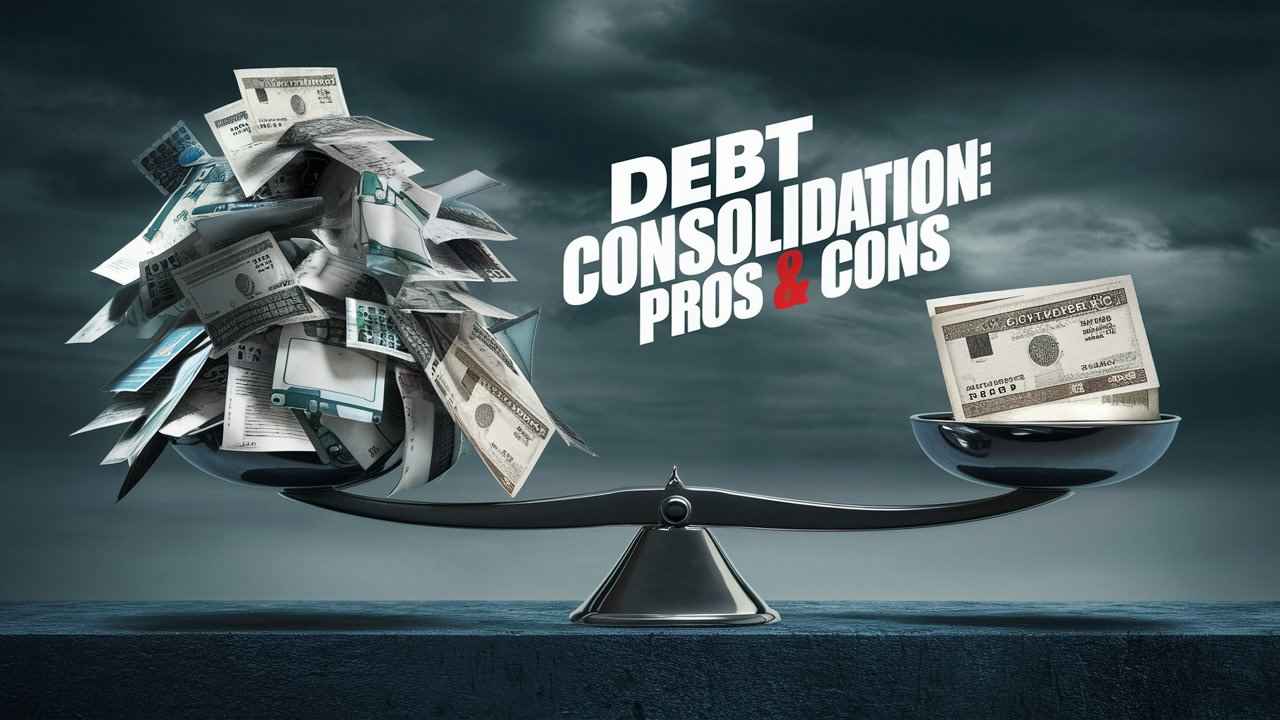Debt Consolidation: Pros & Cons
The Debt Dilemma – Should You Consolidate?
Debt. The word itself feels heavy, like dragging a suitcase filled with lead through a never-ending airport terminal. You’re in the financial weeds, juggling credit cards, loans, medical bills🤝it’s a mess. The calls from creditors don’t help either. Enter the shiny solution: Debt Consolidation. But is this the knight in financial armor you’ve been waiting for, or just another weight in your already sinking ship? Let’s dive into the murky waters of debt and figure out if consolidating could be your way out🤝or if you’re just trading one monster for another.

What is Debt Consolidation, Really?
Ah, Debt Consolidation🤝it sounds so official, almost like a magic trick. “Poof! All your debt is gone!” But before you get your hopes up, let’s clarify what it actually is. At its core, consolidating debt means taking all those pesky individual loans🤝credit cards, medical bills, personal loans, and more🤝and combining them into one larger, hopefully more manageable, loan. You might go from drowning in ten different payments to managing a single, streamlined monthly bill. Sounds like heaven, right? Hold that thought.
The Basics: Combining Your Debts for a Fresh Start
Debt consolidation is like a financial blender. You toss in everything🤝high-interest credit card debt, personal loans, maybe even a payday loan you regret🤝and blend it into one loan with, ideally, a lower interest rate. The idea is that by combining everything, you simplify your finances and lower your overall cost. This isn’t a magical debt eraser, though. It’s more like switching from a five-alarm financial fire to something that merely smolders. You’ll still owe money, but it’s contained.
How It Works: From Credit Cards to Loans – Wrangling It All Together
Debt consolidation can happen in a few ways: you could use a personal loan, a balance transfer card, or even a home equity loan (if you’re feeling daring). In each case, you take a new loan that covers the sum of all your existing debts. Then you make payments on this one shiny loan instead of a dozen. Simplicity is the goal. But just like choosing between jeans or sweatpants, the details of how you consolidate can make or break the experience.

Why Do People Opt for Debt Consolidation?
The Allure of a Single Monthly Payment
Imagine having to remember just one due date instead of keeping track of six or seven bills all due on different days. That’s the hook of Debt Consolidation. It’s like herding cats and finally getting them to line up in an orderly fashion. There’s something intoxicating about turning chaos into control, or at least the illusion of it. But it’s not just about convenience. There’s usually a hope for a lower interest rate too, which brings us to the good stuff.
The Pros: Why Debt Consolidation Could Be Your Financial Savior
Lower Interest Rates: The Sweet Temptation
Interest rates, the cruel overlords of debt, can either make or break you. One of the biggest perks of Debt Consolidation is that it could lower your interest rate. If you’re paying 18% on a credit card, but can consolidate it all into a loan with, say, 10% interest, that’s a huge win for your wallet. It’s like switching from daily fast food to home-cooked meals🤝you’ll feel lighter and spend less over time.
One Payment, No Problem: Simplifying Your Financial Life
Debt consolidation streamlines your payment process. Instead of juggling multiple bills, you get to enjoy the Zen of one single payment per month. It’s like Marie Kondo for your finances🤝less clutter, more peace. And who doesn’t want a little less chaos in their life?

Credit Score Boost? Maybe, Maybe Not
Here’s the thing: debt consolidation can help your credit score🤝eventually. By lowering your credit utilization ratio and making regular payments on time, you could see your score start to rise. But it’s not an instant miracle. Don’t expect to wake up one day with a credit score that makes you feel like a rockstar. Patience, young grasshopper.
The Path to Debt-Free Bliss: How It Helps You Stay on Track
Consolidation offers structure. With fewer payments and a clear end date in sight, it’s easier to stay on track. You’re not scrambling to cover various minimums and deadlines. Instead, it’s all laid out neatly, like a roadmap to freedom. Less guessing, more clarity.
Goodbye, Stress – How Consolidation Reduces Overwhelm
No one enjoys drowning in bills. Consolidating your debt can give you a sense of relief, helping you breathe easier. It won’t eliminate your debt, but it might just quiet the noise in your head long enough for you to figure out how to tackle it.

The Cons: Why Debt Consolidation Might Just Be a Trap
Longer Repayment Time: The Deal with the Devil
While Debt Consolidation can lower your monthly payment, it often stretches out your repayment term. Sure, you’re paying less now, but over time? It could cost you more. Think of it like binge-watching an entire series in one weekend🤝you think you’re saving time by watching episode after episode, but suddenly, it’s 3 AM, and you’ve lost more than you bargained for.
Hidden Fees and Costs – What Lenders Don’t Want You to See
Lenders have their tricks. Hidden fees, prepayment penalties, and other delightful little surprises can sneak up on you. If you’re not reading the fine print, you could find yourself paying more in fees than you saved in interest. It’s like signing up for a “free” trial and forgetting to cancel🤝suddenly, your bank account is crying, and you’re left wondering how it happened.
It’s Not a Magic Wand: You Still Have to Pay!
Debt Consolidation doesn’t erase your debt. It just repackages it. You still owe money, and if you’re not careful, you can fall into the trap of thinking you’ve solved your problem when really you’ve just kicked the can down the road. The can’s still there, friend, waiting for you.

Credit Score Rollercoaster: The Potential Drop Before the Climb
Consolidating your debt can sometimes lead to a temporary dip in your credit score. Opening a new loan or credit account to consolidate can cause a slight decline at first, which might feel like adding insult to injury. But if you’re diligent, your score will recover. Just hold on during the initial drop🤝it’s like the first steep hill on a rollercoaster. Terrifying, but survivable.
False Sense of Security: Why You Might End Up with More Debt
The biggest danger? Feeling like you’ve fixed your problem when you haven’t. Consolidation can make it seem like your debt has disappeared, but if you don’t change your spending habits, you could end up with even more debt in the future. It’s like eating a salad for lunch and thinking that justifies a pint of ice cream for dessert. Spoiler: it doesn’t.

Debt Consolidation Options: Picking Your Poison
Balance Transfer Credit Cards: Are 0% APR Offers Too Good to Be True?
Ah, the balance transfer credit card🤝0% interest for a year, sometimes longer. Sounds dreamy, right? But be careful. If you don’t pay it off before the promo period ends, interest rates can skyrocket, and suddenly that dreamy card turns into a nightmare.
Personal Loans: The Friendlier Face of Debt Consolidation
Personal loans are like the good-natured friend of Debt Consolidation. They’re straightforward, with fixed interest rates and predictable payments. You know what you’re getting into, but be sure to compare offers. Some “friends” are more reliable than others.
Home Equity Loans: Leveraging Your House for Financial Freedom (or Disaster)
Home equity loans let you borrow against your house to pay off debt. It sounds like a clever trick, but the stakes are high. Mess this up, and you risk losing your home. It’s like using your house as collateral in a poker game🤝risky business.
Debt Management Plans: The DIY Approach with a Counselor’s Touch
Debt management plans involve working with a credit counselor to create a repayment plan with your creditors. It’s a more hands-on, structured approach and can lower your interest rates, but you’ll have to stick to the plan and live without credit cards during the process. A bit like putting your finances on a strict diet.
Who Should Consider Debt Consolidation?
The Ideal Candidate: When It Works Best
If you’re juggling high-interest debt, struggling to keep track of payments, and ready to stick to a repayment plan, Debt Consolidation might just be your golden ticket. You need the discipline to avoid new debt and the patience to work through the process.
Red Flags: When Consolidation is a Bad Idea
However, if you’re barely making ends meet or tend to overspend, consolidation could lead you deeper into the abyss. If you can’t curb the spending that got you into debt in the first place, this might not be your solution.
Can’t Fix Overspending: The Myth of Debt Consolidation as a Cure-All
Debt consolidation is not a magic cure for overspending. If you don’t address the underlying behaviors, you could consolidate your debt, feel relieved, and then run up new debt, thinking you’ve somehow beaten the system. Spoiler alert: the system always wins.
The Alternatives: Other Ways to Tackle Debt
#
Snowball vs. Avalanche: The Battle of Repayment Methods
If consolidation isn’t your jam, the snowball or avalanche method might be more your style. The snowball method focuses on paying off the smallest debt first to build momentum, while the avalanche targets the highest-interest debt to save more in the long run. Pick your fighter and start swinging.
Debt Settlement: The Quick Fix That Might Wreck Your Credit
Debt settlement companies promise to negotiate down your debt for less than you owe. Sounds great, right? But it can wreck your credit and comes with a hefty fee. It’s the equivalent of fixing your car by driving it off a cliff🤝it technically solves the problem, but at what cost?
Bankruptcy: The Last Resort You’d Rather Avoid
Bankruptcy is the nuclear option of debt relief. It wipes out most of your debts but leaves your credit score in shambles for years. It’s a last resort for a reason🤝use only when you’ve exhausted every other option.
How to Get Started with Debt Consolidation
Assess Your Situation: Are You a Good Fit?
Before jumping in, take a hard look at your financial situation. Are you in a position to make consolidation work, or are you just trying to postpone the inevitable?
Shop Around: Finding the Right Lender Without Losing Your Sanity
Don’t settle for the first offer. Compare rates, terms, and fees from different lenders to ensure you’re getting the best deal. It’s like dating🤝don’t commit until you’ve seen what’s out there.
Understand the Terms: Fine Print to Watch Out For
Always read the fine print. Those hidden fees and sneaky clauses can turn a good deal into a financial disaster. Look out for prepayment penalties and fluctuating interest rates. Remember, if it sounds too good to be true, it probably is.
Conclusion:
Is Debt Consolidation a Lifeline or a Money Pit?
Debt Consolidation can be a lifeline for some and a trap for others. It’s not a one-size-fits-all solution. If you’re disciplined and committed to staying on top of your payments, it could simplify your life and save you money in the long run. But if you’re looking for a quick fix or a way to avoid facing your debt head-on, consolidation could just dig you deeper into a financial hole. The key is making an informed choice that sets you up for long-term success. Choose wisely, because your financial future depends on it.
People Also Ask
What are the negative effects of debt consolidation?
Debt consolidation can come with several pitfalls, including:
- Longer repayment terms – You may lower your monthly payment, but over time, you’ll end up paying more in interest.
- Hidden fees – Some loans sneak in origination fees, prepayment penalties, or other costs that could make the loan more expensive than you realize.
- Temporary credit score dip – Opening a new line of credit can initially lower your credit score.
- False sense of security – Consolidation can give you the illusion of debt relief, causing you to overspend and get back into more debt.
Is consolidating debts good?
Consolidating debts can be beneficial if you manage it wisely. It simplifies your payments and could potentially lower your interest rates. However, it’s only good if it helps you pay off debt faster without accruing new debt along the way.
Which is better, personal loan or debt consolidation?
A personal loan can be a more flexible and straightforward option if you only have one or two debts to tackle. Debt consolidation loans are better suited for multiple high-interest debts. Personal loans might come with fewer fees, but debt consolidation loans are designed for simplifying larger debt loads.
Is consolidation positive or negative?
Consolidation can be both:
- Positive: It simplifies your financial life, reduces interest rates, and helps create a clearer repayment path.
- Negative: It can extend the duration of your debt repayment and result in higher total costs if you’re not careful.
What are 4 disadvantages of having debt?
- High interest costs – Debt often comes with exorbitant interest rates.
- Stress and anxiety – Debt weighs heavily on your mental health.
- Limited financial freedom – High debt restricts your ability to save or invest in other areas.
- Credit score damage – Missed payments and high credit utilization can wreck your credit score.
Are debt consolidation companies a good idea?
Debt consolidation companies can be helpful, but many charge high fees and make promises that sound too good to be true. Do your homework to ensure you’re working with a reputable company, and avoid those that ask for hefty upfront fees.
Can I still use my credit card after debt consolidation?
It depends on the type of debt consolidation you use. For example, if you consolidate through a debt management plan, your credit cards might be frozen. However, if you take out a loan to consolidate debt, you can still use your credit cards🤝though this isn’t advisable unless you’ve curbed overspending habits.
What are two rules of consolidation?
- Pay attention to interest rates – Make sure the consolidated loan has a lower interest rate than your original debts.
- Stick to your budget – After consolidating, avoid taking on new debt, or you’ll end up in a worse position than before.
Why is consolidation so hard?
Consolidation can be difficult because:
- Finding the right lender – Comparing terms, interest rates, and fees can be overwhelming.
- Qualification hurdles – Poor credit scores or high debt-to-income ratios can prevent approval for a consolidation loan.
What are 2 problems with consolidation loans?
- Longer repayment period – You might end up paying more over time, even with a lower interest rate.
- Credit score impact – Opening a new line of credit can initially hurt your credit score.
Is debt consolidation bad for your credit?
Debt consolidation can temporarily lower your credit score due to a new inquiry or opening a new account. However, if managed responsibly, it can boost your score in the long term by improving your payment history and reducing your credit utilization ratio.
What is an advantage of debt consolidation?
One key advantage of debt consolidation is simplifying your finances🤝turning multiple payments into one, potentially with a lower interest rate. This makes budgeting easier and reduces the risk of missing payments.
Is it expensive to consolidate debt?
The cost of debt consolidation varies. Fees for personal loans, balance transfers, or home equity loans can add up. If you’re not careful, the fees may outweigh the savings from reduced interest rates.
Does debt consolidation destroy credit?
Debt consolidation itself doesn’t destroy your credit, but missing payments on your new consolidated loan or continuing to accumulate debt can negatively impact your credit score.
What happens when you do debt consolidation?
When you consolidate debt, your existing debts are combined into one loan. You pay off your old creditors, and now only owe payments to the new lender. Ideally, you’ll have a lower interest rate and one easier-to-manage monthly payment.
Why is it so hard to get a debt consolidation loan?
It can be challenging to get a debt consolidation loan if:
- Your credit score is low.
- Your debt-to-income ratio is too high.
- Lenders see you as a risky borrower due to previous missed payments.
What is a disadvantage of debt consolidation?
One disadvantage is that it can lead to a longer repayment period. While the monthly payment may decrease, the overall time to pay off the debt can increase, leading to more interest paid over the life of the loan.
Is it smart to consolidate credit card debt?
It can be smart to consolidate credit card debt if you secure a lower interest rate and avoid running up new balances. It simplifies your payments and could save you on interest, but discipline is key to not falling into deeper debt.
What are some disadvantages of getting a direct consolidation loan?
- Loss of federal benefits – Consolidating federal student loans into a private loan means losing federal protections like income-driven repayment and loan forgiveness programs.
- Higher overall costs – You might end up paying more in interest over time if you extend the loan term.









